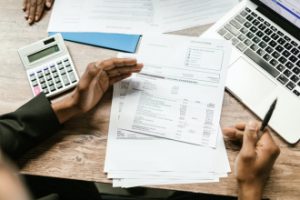ATO Tax Debt, Paying Interest and Negotiations
When it comes to taxes, whether you are a business owner, sole trader, or individual, it can quickly turn into a frustrating and complex process. Even when you maintain your taxes, some cash-flow problems can prevent you from paying your taxes on time.
Many clients in financial difficulty tell us, “I can’t pay my tax debt”. An outstanding tax payment means the Australian Taxation Office (ATO) can take the necessary steps to recover the unpaid tax debt.
Tax Debt for Individuals and Sole Traders Businesses
 If you are an individual or sole trader, you can determine the ATO tax debt you owe by using your myGov account linked to the ATO. You can quickly check the amount due with the payment plan estimator and the automated phone service. You can also find the due date for payment and other information online to stay updated on your taxes.
If you are an individual or sole trader, you can determine the ATO tax debt you owe by using your myGov account linked to the ATO. You can quickly check the amount due with the payment plan estimator and the automated phone service. You can also find the due date for payment and other information online to stay updated on your taxes.
As an individual getting paid by an employer, you might be required to make PAYG (Pay As You Go) instalments. The ATO will calculate your tax payment from last year’s income, and ATO will notify you how often you should make the payment.
ATO Tax Debt for Businesses
If you are a business owner, you can determine your ATO tax debt through your ATO business portal, where you can also see your ato tax debt payment plan. It highlights all the details, including the amount due, due date, and reference number. You can also determine your taxes by checking your last income tax assessment or calling ATO.
Steps the ATO Take If You Fail to Pay Tax Debt
Failing to pay the tax debt by the due date will automatically result in the ATO adding a General Interest Charge (GIC). The ATO tax debt will continue to increase if you leave it unpaid. It is essential to remember that this interest amount is calculated daily on the outstanding amount and periodically included in the account.
If you cannot pay your tax debt, you should set up an ato tax debt negotiation to avoid further fines and interest payments.
There are some exceptions in which the ATO might cancel or reduce the debt interest. You must make a strong case with the ato tax debt hardship assessor regarding why it is reasonable and fair to cancel or reduce the interest, depending on your circumstance.
External Debt Collection Agencies
If you fail to pay your tax debt, the ATO assigns external debt collection agencies to the case to gather superannuation debts, activity statements, and income tax debts. ATO debt doesn’t have an impact on the credit rating.
- These collection agencies don’t take any commissions
- The debt stays unpaid, which means the company doesn’t ‘sell’ the ATO debt
- It ensures the agencies take professional steps to recover the payment
- The collection agencies have to comply with the ATO guidelines
The collection agencies must follow all privacy and security requirements specified by the government
ATO Tax Debt Negotiation
The external debt collection agency will notify you before they call you. If you fail to respond by the due date highlighted in the letter, the agency will try to contact you or your authorised contactor for the next steps.
Failing To Reach an Agreement
If an agreement hasn’t been reached and you still haven’t paid the ATO tax debt, ATO will take further action. These measures may include the following:
Garnishee Notices: The ATO, using a garnishee notice, can get a business or an individual holding the money for you, for instance, your bank or an individual or company that might hold your money in the future, to get them to directly pay the amount to decrease the amount of debt you owe.
Director Penalty Notice: Through the Director Penalty Notice (DPN), ATO can personally pursue directors for any taxation debt. Suppose the business fails to meet the PAYG, Super Guarantee Charge (SGC), Goods and Services Tax (GST) tax obligations. In that case, ATO has the right to personally recover the unpaid amount from the organisation’s director. The DPN applies to both nonreported and reporting obligations.
ATO has not issued any DPN throughout the pandemic as part of the ato relief from tax debt covid-19. Still, things are expected to change as businesses return to their regular operations from 2022 onwards. Managing ATO tax debt is crucial because ATO will soon start recovering outstanding debt. The directors of the companies won’t be able to hide behind cooperation protection.
This means that company directors might put their houses or other personal assets on the line. Moreover, once the DPN has been issued and the time to comply has expired, the DPN can’t be revoked by ATO. Therefore, you must act quickly as soon as you receive a DPN.
When the Director Penalty Notice has been issued, it makes it possible for ATO to begin any appropriate legal proceedings to recover the unpaid tax debt. After all these attempts, if the ATO can still collect the debt you owe, it can take further steps according to the situation. These steps might include:
- Take measures to wind up the organisation if the company fails to make the tax debt payments or enters the payment plan.
- Delivering statutory demands requires the organisation to pay all its debt or begin a 21-day payment plan.
- Filing a petition of creditors that can result in you going bankrupt
- Filling summons or claims.
Transparency and communication are integral to dealing with ATO tax debt and are becoming increasingly important as they progress in the debt recovery process. There are numerous reasons why business owners face issues in resolving the tax debt problem by setting up a payment plan.
Andrew Bell Insolvency Advisor
Let’s Talk
With over 30 years of experience in debt solutions and Insolvency in Australia, Andrew can find a solution for you.
“Nothing is more satisfying to me than knowing that I’ve helped someone get back on their feet by guiding them through the insolvency process. Rest assured, you’re in good hands with me as we solve your financial problems together.”

